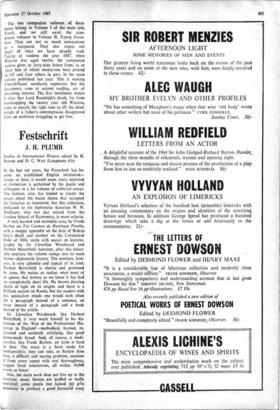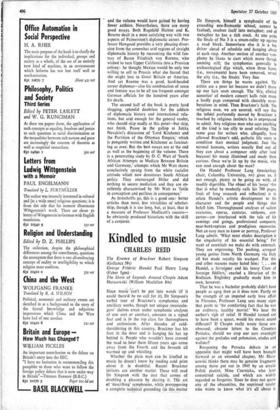Festschrift
J. H. PLUMB
In the last ten years, the Festschrift has be- come an established English institution— sooner or later, it would seem, every historian of distinction is acclaimed by his pupils and colleagues in a fat volume of collected essays. The fashion, also, has tended to cluster the essays about the major theme that occupied the historian so honoured, but this collection, dedicated to the diplomatic historian W. N. Medlicott, who has just retired from the London School of Economics, is more eclectic.
A very learned and recondite essay by Frank Barlow on The Carmen de Hastingae Proelio, with a snappy appendix on the date of Bishop Guy's death and another on the Coronation Ordo of 1066, jostle with essays on historio- graphy by Sir Llewellyn Woodward and Herbert Butterfield; however, after this delect- able overture the volume swings into its main theme—diplomatic history. The overture, how- ever, is very splendid and typical of its kind. Herbert Butterfield is elusive and profound by turns. He makes us realise, what most of us ignore, that history as we know it has had an exceptionally short life. He throws piercing shafts of light on its origins and there is a brilliant section on Ranke, but for readers with less quicksilver minds one would wish often for a paragraph instead of a sentence, an essay instead of a paragraph and a book instead of the article.
Sir Llewellyn Woodward, like Herbert Butterfield, is very much himself in his dis- cussion of the 'Rise of the Professional His- torian in England'—methodical, learned, re- strained and curiously satisfying, like good home-made bread. And, of course, a medi- aevalist, like Frank Barlow, on form is hard to beat. The essay is a form made for mediaevalists; they can take, as Barlow does here, a difficult and teasing problem, examine it from every aspect with real thoroughness, suggest fresh conclusions, all within 10,000 words or fewer. •
Alas, the main work does not live up to the overture; many themes are muffed or badly executed; some pupils just lacked the gifts necessary to produce a good historical essay
and the volume would have gained by having fewer authors. Nevertheless, there are many good essays. Both Ragnhild Hatton and K. Bourne dealt in a most satisfying way with two aspects of Palmerston's diplomatic career. Pro- fessor Hawgood provides a very pleasing diver- sion from the somewhat arid regions of straight diplomatic history by recounting the wild fan- tasy of Baron Friedrich von Roenne, who wished to turn Upper California into a Prussian colony: he thought Mexico would be only too willing to sell to Prussia what she feared that she might lose to Great Britain or America. And yet Roenne was a good, hard-headed career diplomat—also his combination of sense and fantasy was to be all too frequent amongst German officials for the hundred years after his death.
The second half of the book is pretty hard slogging, splendid doubtless for the addicts of diplomatic history and international rela- tions, but arid enough for the general reader, who should skip madly at this point—but skip, not finish. Pause in the gallop at Jukka Nevakivi's discussion of 'Lord Kitchener and the Partition of the Ottoman Empire,' which is pungently written and Kitchener as fascinat- ing as ever. But the best essays are at the end as well as the beginning of the volume. There is a penetrating study by D. C. Watt of 'South African Attempts to Mediate Between Britain and Germany,' attempts which Mr Watt shows conclusively sprang from the white racialist attitude which now dominates South African policy. They encouraged Hitler and did nothing to secure mediation and they are ex- cellently characterised by Mr Watt as 'futile in conception and perilous in consequence.'
As festschrifts go, this is a good one: better articles than most, less trivialities of scholar- ship, though it is too long, but, at least, that is a measure of Professor Medlicott's success— he obviously produced historians with the skill of a conjurer.











































 Previous page
Previous page